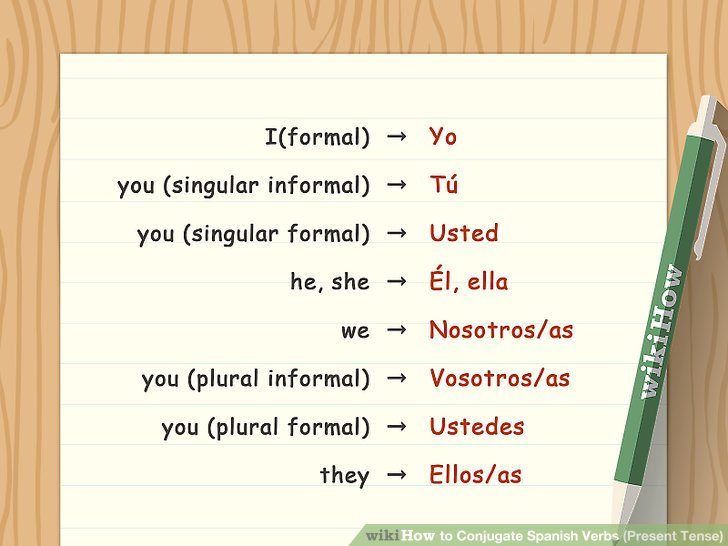Click to see all conjugation charts of encantar in every tense
In this Spanish conjugation lesson we will see how to inflect the verb encantar in the Presente tense of the Indicativo mood. It means we will see step by step how to create and translate forms of each grammatical person.
This lesson is specifically about the encantar conjugation. For a general overview of all the Simple Tenses conjugation see our Simple Tenses Conjugation Chart.
We also have a Video Presentation on how to conjugate verbs in Presente. It’s embedded below, but using the above link you will find more detailed information on conjugation in this tense as well as explanation of special cases and exceptions.
How to translate Presente to English
Notice that the phrases in English provided below next to each conjugation are not direct translations from Spanish to English. They are usually the closest general equivalents. The example differences are:- In Spanish conjugation, there is the form usted in the third person singular. But this person does not translate to the English third person singular. It translates to the so called formal you and uses the inflected form which is most often represented as he/she/it in English conjugation charts.
- Similar situation happens in the third person plural, where ustedes translates to the English plural formal you but uses the form which corresponds to the they form in English.
- Tenses are used differently in Spanish and English, so the actual translation should always take into account the context and focus on translating the meaning, not just words.
- In both languages each verb may have multiple meanings and not every meaning translates directly to the other language. Here also, the context and focusing on the particular meaning helps to create the most accurate translation.
The Spanish Presente de Indicativo tense translates to one of the following:
- The English Present tense, for example: vosotras encantáis(feminine, plural) you love
- The English Present Progressive (also called Present Continuous) tense, for example:ahora yo encantoI am loving now
Notice that the Spanish equivalent of the Present Progressive also exists and is in common use – that’s Presente Progresivo (or Presente Continuo).
Note the timeline
The ability to correctly locate the desired position on the timeline is an important skill for the right use of tenses. So pay attention to the timeline in our lessons and visualize it while speaking, listening, writing and reading. After a bit practice you will be capable of selecting the right tense to use much easier.
Step by step instructions
Presente belongs to the simple tenses group, which means that all of its conjugated forms are one word long. There are also compound (compuesto) tenses in Spanish language, where each inflected verb form consists of two words.The verb encantar has a completely regular conjugation in the Presente tense of the Indicativo mood. It means this verb simply follows the basic rules for its group (-ar) without spelling corrections or exceptions. The basis for the conjugation in this tense is the stem of the verb, so we have to begin by splitting the infinitive into a stem and an ending. It’s easy to do. Just remove two letters from the end of the infinitive form and you have the ending — one of -ar, -er or -ir. What’s left is the stem. So in case of the verb encantar it’s easy to see that:- the stem is: encant-
- and the ending is: -ar
- yo encanto – I love
- tú encantas – you love
- él encanta – he loves
- ella encanta – she loves
- usted encanta – (formal) you love
- nosotros encantamos – we love
- nosotras encantamos – (feminine) we love
- vosotros encantáis – (plural) you love
- vosotras encantáis – (feminine, plural) you love
- ellos encantan – they love
- ellas encantan – (feminine) they love
- ustedes encantan – (formal, plural) you love
That’s it! The conjugation is now complete. The final result looks as follows:
| yo | encanto | I love |
| tú | encantas | you love |
| él/ella/usted | encanta | he/she/it loves |
| nosotros/nosotras | encantamos | we love |
| vosotros/vosotras | encantáis | you love |
| ellos/ellas/ustedes | encantan | they love |
But do not end your session yet – it is very important to repeat and practice the material in order to remember it. Check below for example phrases and some links.
Example sentences
Me encanta cuando los niños sonríen.
I love it when the children smile.
Cuando inicia la primavera, a María le encanta ir a acampar con su familia en el bosque.
When spring comes, Maria loves to go camping with her family in the wood.
Mi trabajo nuevo me encanta y nunca estoy aburrido porque hay un montón de cosas interesantes para hacer.
I love my new job and I'm never bored because there are plenty of interesting things to do.
A los dos nos encanta el cine.
We both love cinema.
Nos encanta pasar nuestras vacaciones en las montañas.
We enjoy spending our holidays in the mountains.
Me encanta saborear tus nuevas recetas.
I love to taste your new recipes.
Next Steps to Perfection
|
Report a mistake | Give feedback
Thank you very much for making the effort to contact us!
We strive to provide the highest quality content and we greatly appreciate even the smallest suggestions:
We strive to provide the highest quality content and we greatly appreciate even the smallest suggestions:



